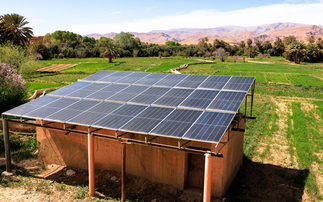Renewables are now firmly in the mainstream - even the FT agrees - but barriers remain to delivering the scale that is needed
In the midst of the media shellacking the Conservative Party faced last week over its controversial social care plans The Independent's political correspondent Jon Stone noted on Twitter that "If the FT is using 'Dementia Tax' on its front page then it's basically the official name of the policy". By the same yardstick if the Pink 'Un reckons the renewable energy revolution has become "unstoppable" then that's basically the business reality.
Pilita Clark's brilliant overview of "The Big Green Bang" and the paper's series of events under the banner FT Clean Energy Week are the latest indication that clean energy's march towards mainstream acceptance is all but complete.
You could argue the timing has proven particularly prescient, as the FT's exploration of the renewables industry has come in the midst of flurry of milestone announcements for the sector.
The deadline for Clark's article was just too early for the ultra-low bids tabled by wind farm developers in the latest Spanish and German energy auctions, the "historically low price" reported by Tucson Electric Power for its latest Arizona solar farm, and the news California got 80 per cent of its power from renewable sources earlier this month.
It also just missed out on the latest IRENA report detailing how nearly 10 million people work in the clean energy industry globally, the fresh wave of investments in the UK's energy storage sector, and the news DONG Energy is selling off its oil and gas assets in pursuit of its strategy to become "a leading, pure play renewables company".
And talking of DONG Energy, it was just last week that the Danish energy giant cut the ribbon on its Burbo Bank Extension offshore wind project, alongside its co-investors, pension fund PKA and LEGO Group parent company KIRKBI A/S. The project not only marked the first commercial deployment of giant 8MW turbines, but it also allowed LEGO Group to claim it had 'balanced' 100 per cent of its renewable energy use with energy from renewable sources that it had invested in. That announcement came as it emerged Tesco has set a target to become 100 per cent renewable powered by 2030 and Unilever reported that all 15 of its UK sites are now renewable powered thanks to a deal with a Scottish wind farm.
You could argue this was a case of great timing for the FT, but then again, pretty much every week is like this for the global renewables industry currently. Cost records keep falling, energy storage and grid innovations continue to make rapid progress, and support from the wider business community is stepping up a gear.
It is this last point that provides one of the most intriguing aspects of the renewable energy industry's march into the mainstream, as well as an opportunity to unlock the next phase of the renewables revolution.
The speed with which some of the world's most high profile companies signed up to the RE100 initiative and a set targets to source 100 per cent of their power from renewable sources has been remarkable. Crucially, this trend has been driven by not just the desire to garner reputational benefits, but also a recognition that falling renewables costs and the ability to lock in stable and competitive energy prices through long-term power purchase agreements means there is a genuine commercial rationale for such investments.
But alongside these opportunities, 100 per cent renewables commitments come with two risks that companies need to be aware of.
The first is a personal gripe, but as awareness of 100 per cent renewables targets grows it could become an issue for some firms. I have lost count of the number of times BusinessGreen has received a press release proudly announcing that a company is going to switch to 100 per cent renewable energy only for a spokesperson to sheepishly admit that there's been a mistake and they meant 100 per cent renewable power. Some companies are admirably switching to green gas and can make the 100 per cent renewables claim with greater credibility (although the next question is then how do they fuel their transport fleets?). But on the most part corporate targets are currently restricted to electricity and are too often being spun by over-zealous PR teams - thanks to imprecise language a hugely admirable endeavour risks being tarnished with a splash of 'greenwash'.
Even where the targets are more clearly defined there needs to be absolute clarity on how the 100 per cent renewables claim is backed up. Some companies, like LEGO, claim they have balanced their energy use with investment in renewables projects, others use renewable energy certificates, some sign up to green energy tariffs, some install technologies to generate renewable power onsite, and some sign power purchase agreements directly with renewable energy project owners. Each of these approaches have their merits, but with certificates and investment-led approaches there are risks associated with additionality and double counting that savvy firms need to address.
Tesco's 100 per cent renewables target is a great example of how it should be done, stating unequivocally that "the company is committed to sourcing 100 per cent of its electricity from renewable sources by 2030 - to include over 50 per cent from PPAs and on-site generation - and has an interim milestone to source 65 per cent renewable electricity by 2020".
The second risk is much greater than the problems created by some imprecise marketing spin. What happens if you want to source 100 per cent renewable power, but there is not enough clean power to go around?
There are reasons to be optimistic this scenario will not come to pass. In the UK renewables already account for around a quarter of the power mix and the government has quietly upped its projections for renewable energy deployment through the 2020s in response to falling costs. Globally, renewables continue to dominate the pipeline for new power projects. However, looking at the UK again, the companies with 100 per cent renewables pledges - Tesco, BT, Unilever, and the like - are so big they account for a discernible chunk of national power demand. If more firms make similar commitments and renewables deployment falters for any reason they could find themselves fighting over a scarce resource. Multinationals making global 100 per cent renewables pledges face even more acute challenges matching huge power demands with supplies while often operating in countries with extremely immature clean power sectors.
There is a fascinating academic debate underway about whether we can run a grid using 100 per cent renewable power, but regardless of the outcome it is clear we can run a grid with a much higher share of renewables than we have currently - and if blue chip firms want to be 100 per cent renewable powered that is what we need to see.
There are lots of good reasons to hope these demands can be met, both nationally and internationally, over the next 12 years. The plummeting cost of wind, solar, and storage technologies, backed by post Paris Agreement political support, will continue to enable the rapid roll out of renewables capacity.
However, as with most issues related to climate change there is absolutely no room for complacency. Taking the UK as the example one last time, a series of policy changes and delays means the surge in investment that established renewables as a quarter of the power mix is now at risk of grinding to a halt. The pipeline of onshore wind and solar farm projects has been deliberately blocked, the market for small scale renewables is sluggish, decisions on tidal energy have been deferred, and while an auction for new offshore wind projects is underway the level of long term financial support for the sector remains anyone's guess.
The Conservative Party manifesto's promise of support for onshore wind on Scottish islands and notable silence on both mainland onshore wind farms outside of England and solar farms anywhere revives hope the sectors could find its route to market re-opened. The pledge to undertake an independent review of energy costs, which will find it hard to ignore the evidence on renewables' cost competitiveness, similarly holds out the prospect of a further boost for the UK's renewables project pipeline.
This progress was hard-won by the renewables industry, but it is not yet guaranteed to deliver turbines and solar panels on the ground. As ever, a political battle looms. Will the government pick up the phone and call the nearest gas-friendly academic to chair an independent review that relies on IEA projections for renewables that have proven to be hopelessly conservative? Or will it appoint someone with a deep understanding of the disruptive forces unleashed by renewables? Will it face down backbenchers who continue to oppose all onshore wind farms as a matter of course, or recognise the financial savings for bill payers offered by cost effective new capacity? Will it tweak the regulatory regime to accelerate the crucial energy storage market? Will it move quickly to deliver the next round of offshore wind farms and drive continued progress on marine energy and genuinely sustainable biomass? Will it provide a vision for delivering renewable heat?
The renewables industry is campaigning hard for positive developments on all these issues, but it inevitably fails the Mandy Rice-Davies test: 'they would say that wouldn't they'. What is needed is for the companies that want to use the clean power renewables developers want to deliver to step up calls for the policy, legislative and investment climate that is required.
Globally there is an assumption that once renewables become cost-competitive across multiple geographies the power of the market will force fossil fuels from the grid. But sadly it is not quite that simple. Without wide spectrum business backing for renewables there are plenty of legislative barriers that can be placed in the industry's path - from unfair tax treatment to punitive grid charges, a market already tilted against clean energy through the failure to adequately price pollution can easily be distorted still further.
The FT is right, the plummeting cost of clean technologies means the renewables revolution is now unstoppable, but the pace at which it proceeds is still very much up for grabs. It is up to the business community as a whole, not just the clean energy sector, to make the case for it accelerating as fast as possible.










